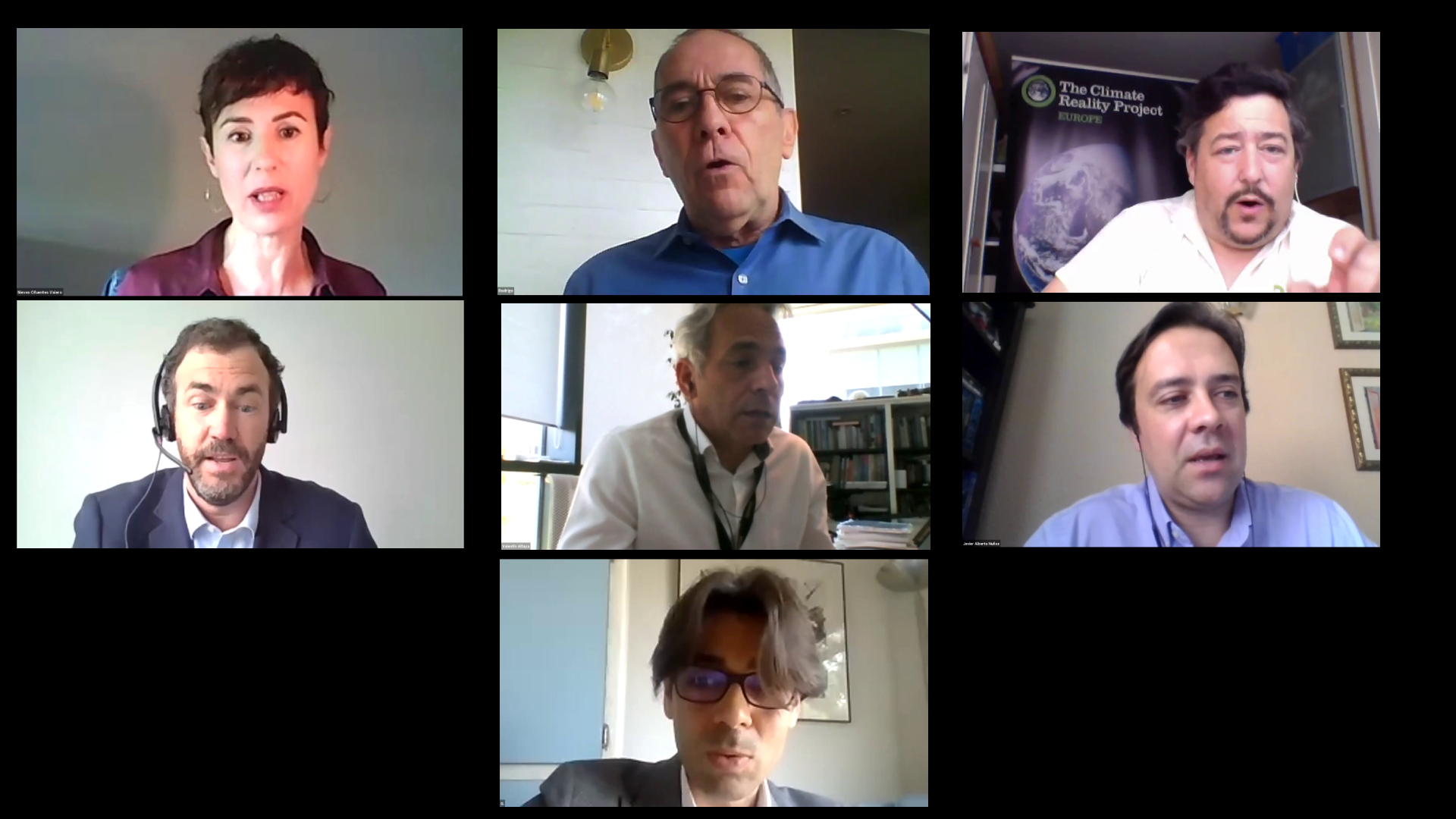The communication agency MARCO continues its programme of sectoral webinars to analyse communication challenges in the COVID-19 era. Here, under the title New Sustainable Societies post-COVID-19: Renewables and Innovation, representatives from Naturgy, Ferrovial, Kaiserwetter, The Climate Reality Project Europe, ALDRO Energía and APPA Renovables discussed the impact of the pandemic on the energy sector and the climate challenges of post-COVID society. Participants agreed on a way out of the crisis based on the fulfilment of the green agenda as the scientific evidence of the cause-effect of the global socio-economic model implies a future paradigm shift.
COVID-19 as a turning point for the energy transition
The global crisis has put a break on upward trends in the green energy sector as well as the reinforced commitments following COP25. The fall in oil prices, together with the drop in energy demand, has slowed down investment in renewable energies during the first period of the crisis. In the face of this, attendees suggested that greater cooperation between public and private institutions would be essential to reversing this trend.
The way out of the crisis is to reinforce a green agenda together with a greater commitment to technology for an effective transition. The experts agreed on how “the global crisis has been the first real experiment of the application of an inevitable paradigm shift in our working habits, energy consumption and mobility,” said Nieves Cifuentes, Naturgy’s Corporate Head of Environment and Sustainability. This perspective is shared by Naturgy: “Renewable energies have been able to cover more than 70% of the demand during this period.”
As Álvaro Rodríguez, General Coordinator of The Climate Reality Project Europe in Spain, explained, “we are experiencing three crises at the same time: a health crisis, an economic crisis and an environmental crisis, and all three can probably have the same outcome. Confinement has been an experiment in ceasing emissions on a global scale, due to which, for the first time, the real consequences of a change in the energy consumption model have been implemented and can be measured.”
As a reference to the drastic change experienced globally, Rodrigo Villamizar, Head of Strategy Americas at Kaiserwetter has highlighted how we have gone from a situation of oil shortage to its depreciation. “We have to reduce the consumption of coal and oil and go for an economy beyond fossil fuels. To reach Net 0 and negative, cooperation between countries, the promotion of renewable energies and the application of technologies such as artificial intelligence, big data or preventive data analysis are essential.” According to the figures shared by Villamizar, on a global scale this changed model could also mean the generation of up to 100 million jobs around the green energy sector by 2050.
Global climate awareness in post-COVID society
Global awareness was one of the points around which the meeting revolved. According to MARCO’s study “Post COVID-19 Consumer Habits”, 65% of Spaniards have become more aware of the effects of climate change.
With respect to how the media agenda has affected the global perception of the climate crisis, Valentín Alfaya, Director of Sustainability at Ferrovial said that “as has happened in other informative areas, our perception is that the media’s treatment of climate change has reduced, but nevertheless the green agenda continues, and not only continues, but has accelerated.” Here, the need to exploit the correlation between the environment, the green agenda and public health, as well as the resilience of our societies, was emphasised.
Despite the short-term effects, according to Ferrovial’s spokesman, “there is a long-term trend that continues and maintains the reorientation of investment towards less carbon-intensive activities.” This will positively affect sectors such as renewable energy, sustainable mobility and electrification processes. “For change to occur, coordinated action is needed, along with legal certainty to attract private capital to green sectors of the economy.”
The panellists pointed out that private investment should take the weight for change to be possible in the next decade. Along with this, “tax incentives are important, as is empowering the consumer. This is made possible by digitalisation and placing data management in the hands of the client, who is the driving force behind the change”, remarked Antonio Colino, General Manager of ALDRO Energía in Spain and Portugal (PITMA Group).
Climate awareness in turn will mean greater social demand on companies. According to the MARCO study, 37% of Spaniards expect alternative actions from a company in times of crisis. Among these activities, one in three Spaniards chose to prioritise environmental responsibility and attention to society as commitments that the business sector must make.
Javier Alberto Muñoz González, Director of Communication and Institutional Relations at APPA Renovables, explained that “the COVID-19 crisis has exposed the vulnerability of our health, but also the vulnerability of the economy itself. In addition, it has allowed us to see that the problem of teleworking was not technological, it was a problem of corporate culture. On the positive side, it is worth noting that the electrical industry has supported peaks of more than 70% of renewable energy and that we have realised that, with some changes to our way of life, we can significantly reduce environmental pollution.”
To conclude the session New Sustainable Societies post-COVID-19: Renewables and Innovation, the experts agreed on how the necessary way out of the crisis has to be the green way out. The lessons of the first half of 2020, marked by the health crisis, have shown the impact of the human footprint and of scientific evidence. Changes in habits such as teleworking, the reduction of mobility and the coordinated action of citizens, has established a precedent that represents a leap of 10 years in the fulfilment of environmental commitments that have been promised by the international community to date.




Comments